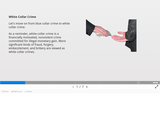
White Collar Crime Slideshow
- Subject:
- Career and Technical Education
- Criminal Justice
- Material Type:
- Interactive
- Provider:
- Michigan Virtual
- Date Added:
- 07/29/2019

White Collar Crime Slideshow
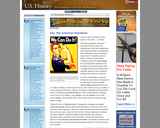
The large population, generous natural resources, advanced infrastructure, and solid capital base were all just potential. Centralization and mobilization were necessary to jump-start this unwieldy machine. Within a week of Pearl Harbor, Congress passed the War Powers Act, granting wide authority to the President to conduct the war effort. Throughout the war hundreds more alphabet agencies were created to manage the American homefront.
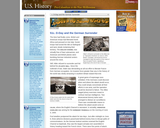
The time had finally come. British and American troops had liberated North Africa and pressed on into Italy. Soviet troops had turned the tide at Stalingrad and were slowly reclaiming their territory. The English Channel was virtually free of Nazi submarines, and American and British planes were bombing German industrial centers around the clock.
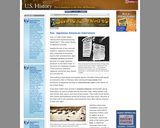
Many Americans worried that citizens of Japanese ancestry would act as spies or saboteurs for the Japanese government. Fear not evidence drove the U.S. to place over 127,000 Japanese-Americans in concentration camps for the duration of WWII.
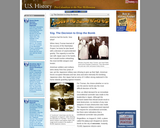
When Harry Truman learned of the success of the Manhattan Project, he knew he was faced with a decision of unprecedented gravity. The capacity to end the war with Japan was in his hands, but it would involve unleashing the most terrible weapon ever known.
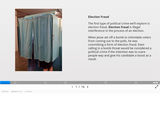
Election Fraud Slideshow

Espionage and Edward Snowden Slideshow
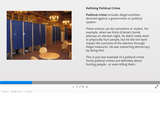
Defining Political Crime Slideshow
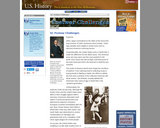
After the end of World War II, no single foreign policy issue mattered more to the United States for the next 50 years as much as the Cold War. President Truman set the direction for the next eight presidents with the announcement of the containment policy. Crises in Berlin, China, and Korea forced Truman to back his words with actions. The Cold War kept defense industries humming and ultimately proved the limits of American power in Vietnam. Democracy was tested with outbreaks of Communist witch hunts.

Political Crime Notecards
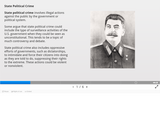
State Political Crime and Geneva Conventions Slideshow
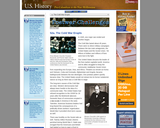
In 1945, one major war ended and another began. The Cold War lasted about 45 years. There were no direct military campaigns between the two main antagonists, the United States and the Soviet Union. Yet billions of dollars and millions of lives were lost in the fight.
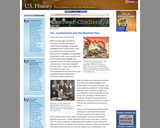
Communism was on the march. A mid-level diplomat in the State Department named George Kennan proposed the policy of containment. Since the American people were weary from war and had no desire to send United States troops into Eastern Europe, rolling back the gains of the Red Army would have been impossible. But in places where communism threatened to expand, American aid might prevent a takeover. By vigorously pursuing this policy, the United States might be able to contain communism within its current borders.
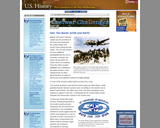
Berlin, Germany's wartime capital was the prickliest of all issues that separated the United States and Soviet Union during the late 1940s. The city was divided into four zones of occupation like the rest of Germany. However, the entire city lay within the Soviet zone of occupation. Once the nation of East Germany was established, the Allied sections of the capital known as West Berlin became an island of democracy and capitalism behind the Iron Curtain.
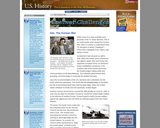
Containment had not gone so well in Asia. When the Soviet Union entered the war against Japan, they sent troops into Japanese-occupied Korea. As American troops established a presence in the southern part of the Korean peninsula, the Soviets began cutting roads and communications at the 38th parallel. Two separate governments were emerging, as Korea began to resemble the divided Germany.
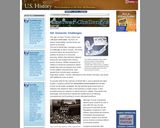
The end of World War II brought a series of challenges to Harry Truman. The entire economy had to be converted from a wartime economy to a consumer economy. Strikes that had been delayed during the war erupted with a frenzy across America. Inflation threatened as millions of Americans planned to spend wealth they had not enjoyed since 1929. As the soldiers returned home, they wanted their old jobs back, creating a huge labor surplus. Truman, distracted by new threats overseas, was faced with additional crises at home.

Drug Trafficking and Cartels Slideshow
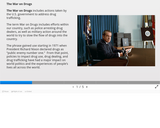
The War on Drugs Slideshow

In this engineering, math, and sustainability project students answer the question, “Can I ride 53 miles on a bike from the energy of a single burrito?” They must define their variables, collect and analyze their data, and present their results. By the end of this project, developed by Allen Distinguished Educator Mike Wierusz, students should have all the information they need to design a burrito that would provide them with the exact caloric content necessary to ride 53 miles.
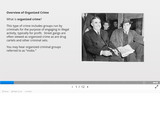
Overview of Organized Crime Slideshow